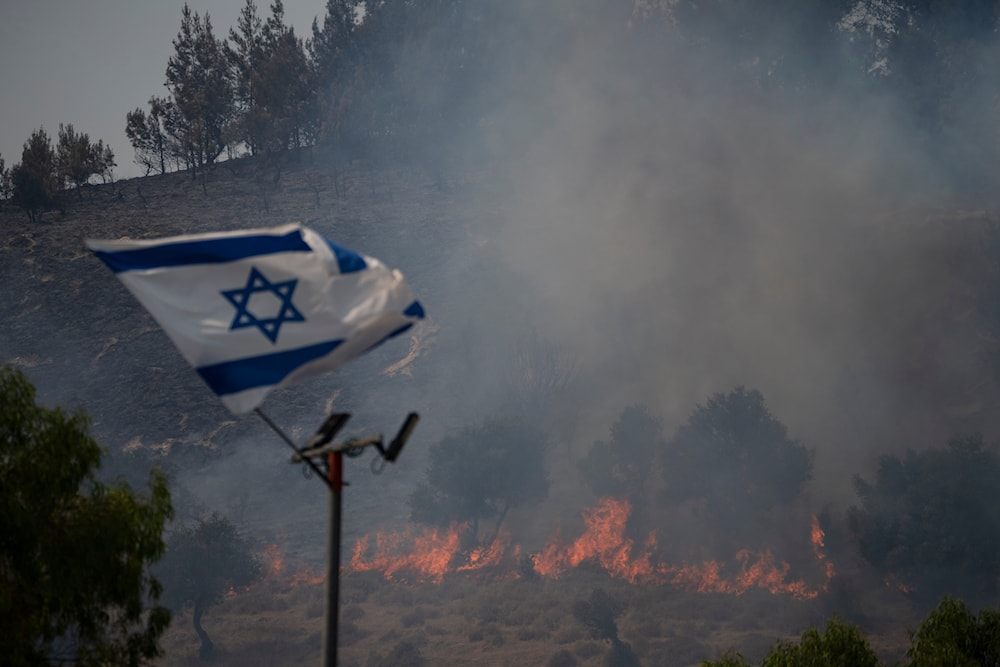Dark future awaits 'Israel' after war on Gaza, Foreign Affairs says
Foreign Affairs underlines that the destructive path down which the Israeli occupation is heading will lead to its demise.
-

An Israeli flag flutters next to a fire burning in an area near the border with Lebanon, northern occupied Palestine in Safed, June 12, 2024 (AP)
In a recent grim analysis, the Foreign Affairs magazine has painted a gloomy picture of the Israeli regime's future in the wake of the war on Gaza, predicting a potential "demise of Israel" and a "dark future" marked by internal instability and increasing global isolation.
The magazine argues that Operation al-Aqsa Flood by the Palestinian resistance on October 7, 2023, struck the Israeli occupation at a moment of profound internal turmoil. It highlights the deep divisions within Israeli society, exacerbated by Prime Minister Benjamin Netanyahu's push for controversial judicial reforms aimed at significantly curtailing the Supreme Court's authority over government actions.
These proposed judicial changes ignited widespread protests, revealing a nation deeply fractured along political lines. According to Foreign Affairs, the ongoing conflict with Gaza has only served to "intensify political divisions within Israel," setting the occupation on a "dangerous and unsustainable trajectory" that could lead to capital flight, brain drain, and escalating internal tensions.
The magazine warns that the Israeli occupation could be on the brink of transforming into a fragmented state, with far-right religious and nationalist groups potentially establishing their own de facto governance, particularly in West Bank settlements. In a more dire scenario, Foreign Affairs speculates that the Israeli occupation might face a violent civil conflict, pitting armed religious extremists against official state institutions.
Moreover, the presence of competing security forces and weakened parliamentary oversight is expected to undermine the Israeli security apparatus overall, potentially leading to the collapse of its governance structures.
While a full-blown civil war has not yet materialized, Foreign Affairs cautions that the Israeli current path will likely result in prolonged instability and economic collapse, potentially leading to its failure.
On the international stage, the magazine notes that the Israeli occupation is becoming increasingly isolated. Despite ongoing support from key allies like the United States, Foreign Affairs asserts that negative global public opinion, coupled with growing legal and diplomatic challenges, will further marginalize the Israeli occupation internationally.
The magazine concludes that while the occupation may find itself politically and diplomatically isolated from much of the global community, including most G7 countries, it is likely to continue receiving economic support from a select few nations, with the United States leading the charge.
Growing isolation
As the Israeli occupation entity anticipates a potential retaliatory strike from Iran following the assassination of Hamas Political Bureau chief Ismail Haniyeh in Tehran, concerns are mounting over one of its key defense mechanisms - a US-led Arab coalition that played a pivotal role in countering the last Iranian attack, The Washington Post reported.
The coalition, which included Jordan, Saudi Arabia, and the United Arab Emirates, became publicly known on April 13, when it assisted "Israel" in intercepting drones and missiles launched from Iran in response to the Israeli aggression on its consulate in Damascus.
At the time, "Israel’s" military chief praised the collaboration as opening "new opportunities for cooperation in the Middle East." At the same time, White House National Security Advisor John Kirby highlighted that it sent "a strong message about where Israel is in the region versus where Iran is in the region."
However, four months later, "Israel" finds itself more isolated in the region, a situation that military analysts warn could increase its vulnerability, The Washington Post pointed out, adding that even with US support, there are growing concerns that Israeli air defense systems may struggle to repel a massive, coordinated attack.
The report highlighted that in April, Arab countries played down their involvement in repelling the Iranian attack, cautious of Tehran's retaliation and reluctant to appear aligned with "Israel" amid widespread public anger over the Palestinian casualties in the Gaza Strip.
Now, Arab states are also seeking to distance themselves publicly from any future interference.
Jordan and Saudi Arabia have explicitly stated they do not want their airspace to become a battlefield, while Egypt has declared it will not participate in a military axis to repel an Iranian attack.

 4 Min Read
4 Min Read








